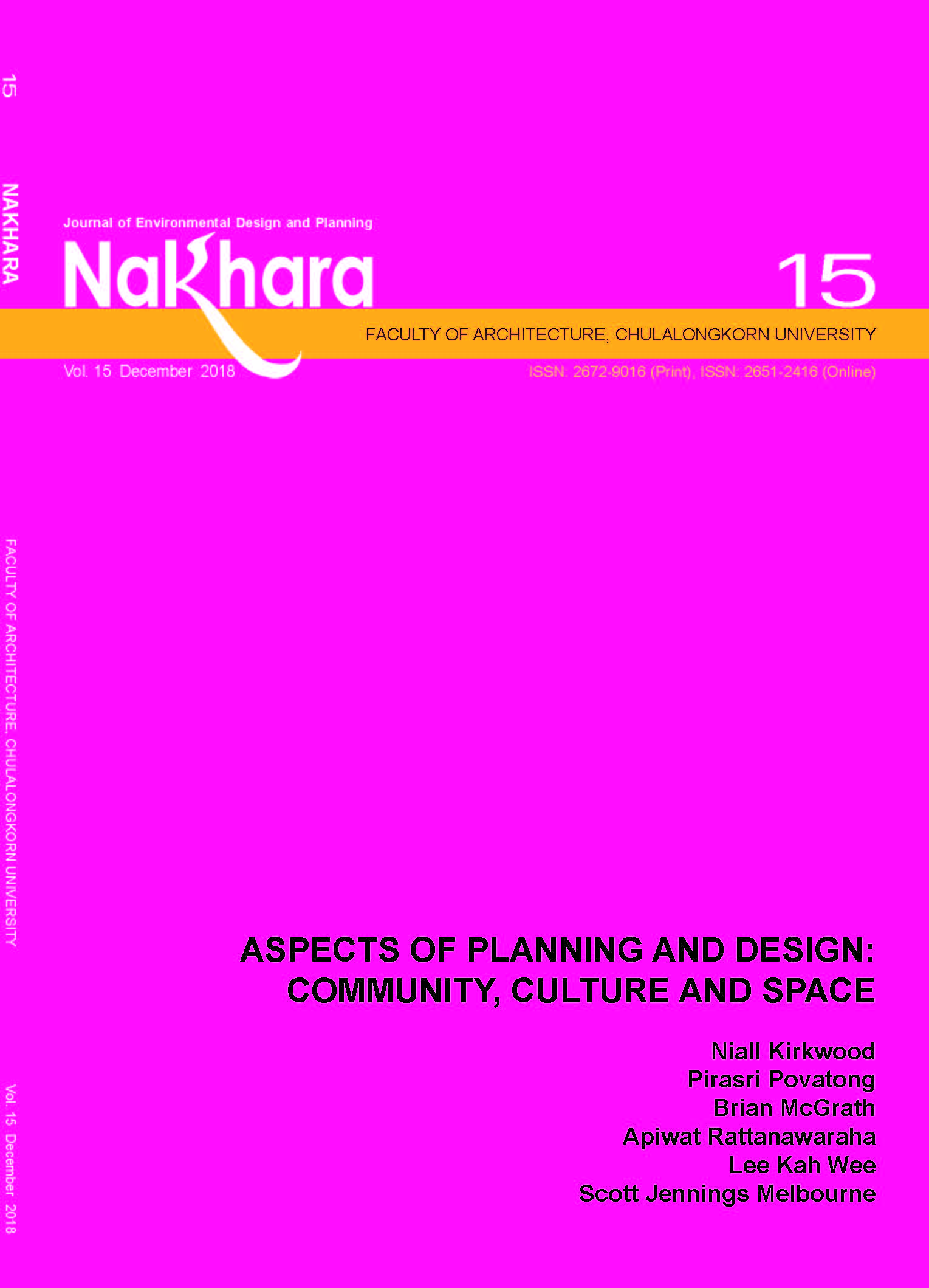Talking About Pen Sao in the 1950s-60s: An Exploration Through Discussion on A History of Design and Manners
Main Article Content
Abstract
This paper presents a case study on the role objects played in the construction of Thai women as social subjects in the period of American Era and Development. Based on the analysis of popular Thai etiquette manual Kritsana son nong: Naenam marayat thi ngam haeng araya samai, I conducted oral history interviews with women growing up in the period. The conversation brought to light the term pen sao and illustrated that while certain objects and practices were portrayed generally as signs of modernity and civilisation, they could also be perceived as suspicious when being viewed as signs of gender differences.
Article Details
How to Cite
Tangsantikul, J. (2018). Talking About Pen Sao in the 1950s-60s: An Exploration Through Discussion on A History of Design and Manners. Nakhara: Journal of Environmental Design and Planning, 15, 1–10. https://doi.org/10.54028/NJ201815110
Section
Research Articles

This work is licensed under a Creative Commons Attribution-NonCommercial-NoDerivatives 4.0 International License.
References
Barthes, R. (1977). Elements of semiology. New York: Hill and Wang.
Beery, Mary. (1949). Manners Made Easy. New York: McGraw-Hill.
Benson, Elaine, & Esten, John. (1996). Unmentionables: A brief history of underwear. New York: Simon & Schuster.
Jory, Patrick. (2015). Thailand’s politics of politeness: Qualities of a gentleman and the making of “Thai manners.” South East Asia Research 23(3), 357–375.
Juthamas Tangsantikul. (2016). Kritsana son nong: The politics and practice of manners in modern Thailand (1950s–1970s). Journal of Southeast Asian Studies, 47(2), 189-209.
Kepner, Susan F. (2013). A civilised woman: M.L. Boonlua Debyasuvarn and the Thai Twentieth Century. Bangkok: Silkworms Book.
Kritsana Thewarak (Santa T. Komolabutra). (1961). Kritsana son nong: Naenam marayat thi ngam haeng araya samai [Kritsana’s instruction to Little Sister: An introduction to the fine manners of the civilised period]. Bangkok: Prae Pittaya.
Margolin, V. (2005). A world history of design and the history of the world. Journal of Design History, 18(3), 235-243.
Office of the Royal Society. (Host and Editor). (2006). Perd sakard [Radio program]. In ru rak pa sa Thai. Bangkok: National Radio Station.
Pattrawadee [pseudonym]. (1966) . Sombat khong kunlasattri [Qualities of a gentlewoman]. Bangkok: Udomsuksa.
Ross, Kristin. (1995). Fast Cars, Clean Bodies: Decolonization and the reordering of French culture. Cambridge, MA.: MIT Press.
Seinee Saowaphong [Sakchai Bamrungphong]. (1957, 2016). Pi saj [The ghost]. Bangkok: Matichon.
Beery, Mary. (1949). Manners Made Easy. New York: McGraw-Hill.
Benson, Elaine, & Esten, John. (1996). Unmentionables: A brief history of underwear. New York: Simon & Schuster.
Jory, Patrick. (2015). Thailand’s politics of politeness: Qualities of a gentleman and the making of “Thai manners.” South East Asia Research 23(3), 357–375.
Juthamas Tangsantikul. (2016). Kritsana son nong: The politics and practice of manners in modern Thailand (1950s–1970s). Journal of Southeast Asian Studies, 47(2), 189-209.
Kepner, Susan F. (2013). A civilised woman: M.L. Boonlua Debyasuvarn and the Thai Twentieth Century. Bangkok: Silkworms Book.
Kritsana Thewarak (Santa T. Komolabutra). (1961). Kritsana son nong: Naenam marayat thi ngam haeng araya samai [Kritsana’s instruction to Little Sister: An introduction to the fine manners of the civilised period]. Bangkok: Prae Pittaya.
Margolin, V. (2005). A world history of design and the history of the world. Journal of Design History, 18(3), 235-243.
Office of the Royal Society. (Host and Editor). (2006). Perd sakard [Radio program]. In ru rak pa sa Thai. Bangkok: National Radio Station.
Pattrawadee [pseudonym]. (1966) . Sombat khong kunlasattri [Qualities of a gentlewoman]. Bangkok: Udomsuksa.
Ross, Kristin. (1995). Fast Cars, Clean Bodies: Decolonization and the reordering of French culture. Cambridge, MA.: MIT Press.
Seinee Saowaphong [Sakchai Bamrungphong]. (1957, 2016). Pi saj [The ghost]. Bangkok: Matichon.

